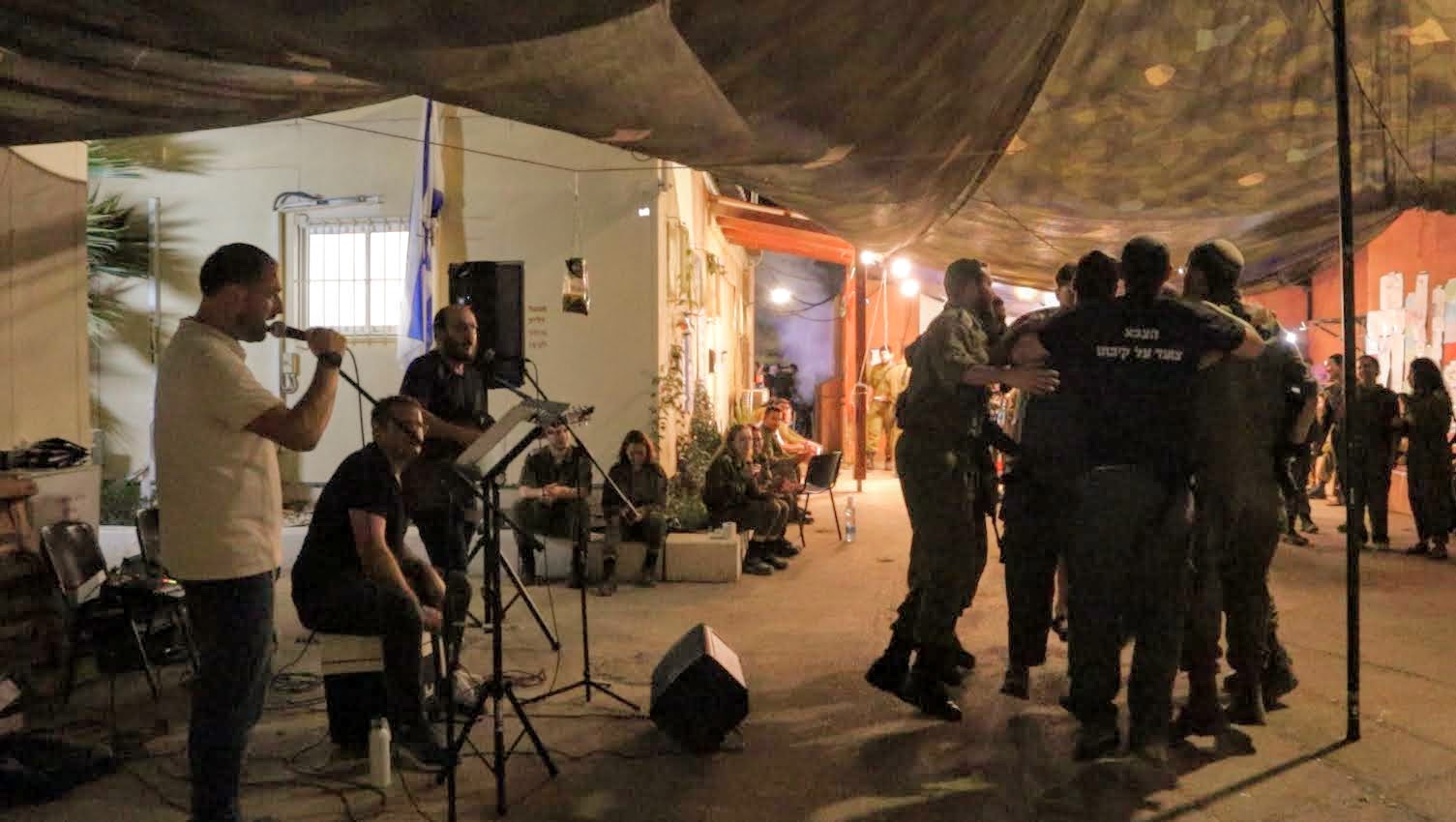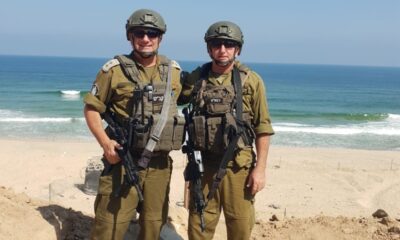
Israel

Music and biltong uplifts the boys on the frontline
From ballads to biltong, olim are working to uplift soldiers fighting to protect Israel. Not only are they giving soldiers a spiritual and physical boost, they’re also buoyed by the knowledge that they’re contributing to the war effort in their own unique way.
“As olim we don’t have weapons – instruments of war – so we picked up our instruments of music to uplift, inspire, and contribute,” says Rabbi Leron Bernstein, the lead vocalist of Hafakot Shniyot, a band that performs at Israeli army bases.
Singing everything from Oasis and Coldplay hits to contemporary and classic Hebrew songs, the band also encourages soldiers to sing and dance as they experience “simple and unburdened moments of joy” amid terror, heartbreak, and danger. A South African oleh and the director of innovation at Koren Jerusalem, Bernstein has always had a love of music, something he shares with his Tel Mond community through the monthly tischim (festive Shabbat gatherings) he conducts with friends.
So, when guitarist Yair Lehrer, an oleh from England who started the tischim, approached Bernstein a few days into the war to become lead vocalist in a band formed to perform for soldiers, he grabbed the opportunity. Lehrer initially formed the band to accompany a friend who was running barbecues for soldiers in the south, and also enlisted English drummer and cajonist Avi Wiesenberg and Australian roadie and videographer Shmuli Kraus.
As their gigs multiplied, Bernstein approached South African oleh, Darren Platzky, the president of his shul in Tel Mond, who through the shul started a crowdfunding campaign to finance the band’s musical equipment. Less than 24 hours later, they’d reached their target.
Explaining the significance of the band’s name, Bernstein says that because in Israel Simchat Torah is one day, Hafakot Shniyot, or second Simchat Torah celebrations complete with music and dancing with the Torah have become widespread on the streets of Israel. The honorary festival was supposed to take place on the night of 7 October, but then the world turned upside down.
“After one of our early performances, a guy came up to us and said that our singing and dancing with the soldiers that night were the fulfilment of the Hakafot Shniyot they lost this year,” Bernstein recalls. “Yair turned to me and said, ‘That’s our name’.”
Bernstein says uplifting soldiers in this way has been a life-changing opportunity. “The war starts and you’re not a soldier, so you ask what impact you can have. Through the band, we can take our talents and backgrounds and create something unique. It’s tremendously meaningful to be able to do this, the privilege of a lifetime.”
Also South African born, Rael Kahn made aliya with his family just days before his eighth birthday. Though he’s spent the subsequent 47 years in Israel, there’s one part of his South African heritage that continues to play a significant role in his life – biltong. “The flavour of biltong is a link to my past in South Africa, part of my identity,” he says. “To this day, I remember gnawing on a strip of biltong during a trip to the Kruger National Park while looking out for the Big Five.”
After they emigrated, Kahn’s parents found it hard to let go of their craving for the quintessential South African snack, so they taught their son how to make biltong and droëwors, which they sold to friends and family. Continuing this tradition, Kahn makes and sells biltong and droëwors as a home-based side hustle.
His biltong also has a history of sustaining Israeli soldiers through periods of war. Called up for duty in the second Lebanon War together with his paratroop brigade unit, Kahn came equipped with dried fruit, nuts, as well as 4kgs of biltong – all he had at the time. He distributed the food among his unit.
“The biltong was a hit for all the obvious reasons – it was lightweight, tasty, and filled with loads of protein,” he recalls. Based on this experience, when the current war broke out, Kahn decided to launch what he calls “Biltong for the Boys”. To date, he’s distributed about 50kgs of biltong through this initiative – about 500 packets – to various frontline army units and has received glowing reviews.
“One of the units I’ve been delivering to is the elite Yahalom unit,” he says. “After a few deliveries, the sergeant major called me to say that biltong has replaced the cans of food the soldiers were carrying into the Gaza Strip. As a result, they’re lighter on their feet as there’s no preparation, can openers, or forks required, they just rip open the bag and eat. It’s become an integral part of their kits.”
Other units have shared similar experiences, saying that sometimes their biltong stash is all they have to eat. Though Israelis are generally more familiar with the American beef jerky, those with South African connections are especially enthusiastic about the biltong. Regardless, most agree that when it comes to biltong and jerky, biltong is the clear winner.
Speaking of his motivation, Kahn says he had to do something to stay sane. “I was in a haze for a couple of weeks after Black Saturday. After years of being in active reserve service, I was feeling useless and frustrated. Making biltong helps keep me busy and to a degree distances me from the post-traumatic stress disorder I’ve been dealing with since 2006.”
Yet, he says, that’s not what this story is about. “It’s about friends of ours in Zur Hadassa where we live, who have three sons serving in combat roles in the Gaza Strip. It’s about the mother frantic with worry about her son in the 101 Paratroop Brigade who hasn’t seen him in more than two months. It’s about the kid serving in the Shaldag unit who lost four of his buddies on 7 October. It’s about the Kaminka family who lost their son, Yanai, on 7 October; and Elia Cohen, also from Zur Hadassa, who was abducted to Gaza.”










